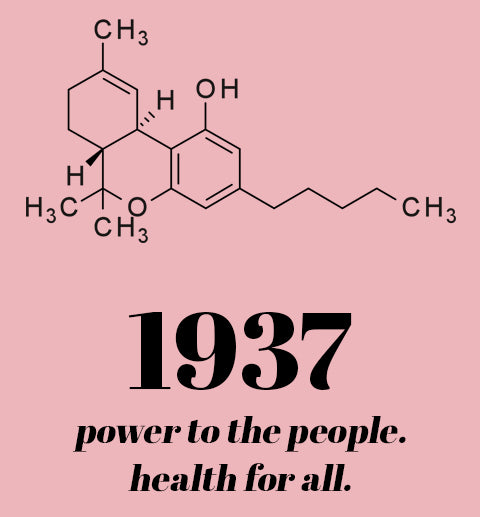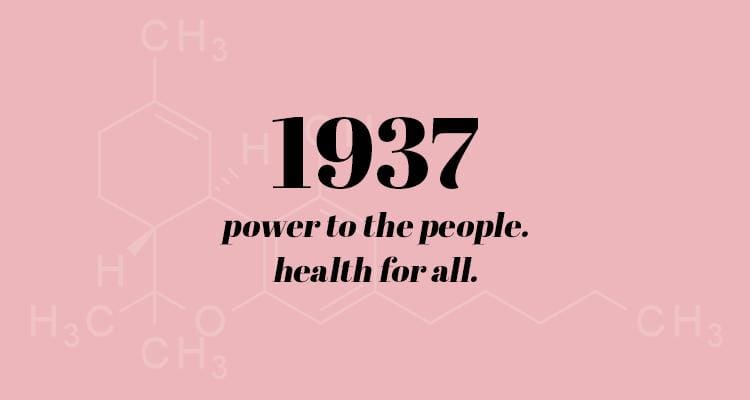1937 Marijuana Tax Act

With the passing of the Farm Bill in 2018, the US government legalized industrial hemp, and CBD (cannabidiol) is now widely available. But this isn’t the first time hemp has been legal or carefully regulated by the government. The 1937 Marihuana Tax Act was an important, if painful, part of hemp history.
On the surface, it appeared that the government legalized the consumption and sale of hemp. But the real story was far less innocent and more closely resembled that of a daytime soap opera. There was money, malicious motives, racial tension, and doctors who just wanted to do what was right for their patients. Sound familiar?
While it’s easy to read about history as if it happened to someone else, it’s important to remember that these were real people. There’s a lot to be learned from the Marihuana Tax Act, especially if we don’t want to repeat the egregious mistakes of the past. So, let’s dive in and find out why this piece of history is just as important today as it was in 1937.
A Brief History of Hemp in the United States
In the 1600s, unlike today, it was widely known that hemp was a useful crop. Its fibers were often used to make ropes for ships, sales, and clothing. In fact, individuals in the Jamestown colony were required to grow it at one point.
Cannabis (which includes hemp) and cannabis products were legal and, as time went on, could be purchased in drug stores and pharmacies. By 1860, the regulation of cannabis was left up to local lawmakers, and it was still largely considered useful for agricultural and medicinal purposes.
Industrial hemp slowly became less prominent, but medical professionals often recommended more potent cannabis to their patients for a number of different ailments. As long as everything was properly labeled, it never seemed to be an issue. The wheels had already been set in motion, however, and the heyday of hemp would soon be over.
A big part of this is because, in the late 1800s, the addictive qualities of morphine became public knowledge. Before that, morphine was commonly added to many medicines which led people to develop painful addictions. The public was outraged and thus began the backlash against drug use.
Morphine was quickly made illegal as a result, and the use of cannabis came under public scrutiny as well. False claims about the dangers of cannabis began to circulate, and this blatant fear-mongering added to its negative public perception.
Leading up to the implementation of the Marihuana Tax Act, industrial hemp was having a surprise resurgence. This is important for two reasons. First, several of the most prominent businesses at the time (timber, nylon, and cotton) would suffer if hemp became too popular. The second reason is because of who owned those competing businesses.
Who Influenced the 1937 Marihuana Tax Act
Secretary of the Treasury, Andrew Melon, At the time, the wealthiest man in American was Secretary of the Treasury Andrew Melon. He had extensive investments in DuPont — a wealthy family who manufactured nylon. Their paper products were mainly produced by the Hearst family, who had a logging and timber business. While the DuPont family disputes these claims today, it’s believed that Andrew Melon wasn’t in favor of hemp because it would have damaged much of his financial holdings.
Another person we should mention now is Harry Anslinger. Before taking a position as the Commissioner of the Federal Bureau of Narcotics (FBN), he made comments denouncing the fear-mongering surrounding cannabis. He was even quoted saying that the idea that cannabis makes people violent was an absurd fallacy. But once he became the Commissioner of the FBN, his outlook changed entirely.
This change was most likely influenced by politics and money. Before he took a position with the FBN, he headed the Department of Prohibition. Alcohol prohibition ended in 1933, so Anslinger’s position became unnecessary. His new position, however, would be much more important if there was a larger “drug” to combat.
Demonizing cannabis essentially became job security for Anslinger. He then began to release statements saying that cannabis would cause psychosis, insanity, and would lead to violent crimes and murder.
Remember, there was almost no scientific evidence to back up these claims. “He contacted 30 scientists...and 29 told him cannabis was not a dangerous drug. But it was the theory of the single expert who agreed with him that he presented to the public — cannabis was an evil that should be banned — and the press ran with this sensationalized version” (CBSNews).
By 1931, 29 states had outlawed the use of cannabis and just six years later the 1937 Marihuana Tax Act was put into place.
The 1937 Marihuana Tax Act
Technically, this act didn’t make cannabis illegal. It enforced stricter regulations and required taxes and extensive documentation. Here’s a breakdown of what it did:
- The possession and sale of cannabis by individuals became illegal.
- Medicinal cannabis use was still legal, but only with extensive fees and taxes.
- Anyone who imported, bought, sold, cultivated, distributed, or prescribed cannabis had to pay a tax.
- If you didn’t pay those taxes, you could get a $2,000 fine and/or five years in prison.
- If you wanted to sell medical cannabis, you were required to keep extensive records of every part of the transaction.
If you don’t look between the lines, this act didn’t look too nefarious. Yes, it required more steps and you had to pay taxes, but you could still legally use medical cannabis. However, if all of that were true, why did cannabis use drop exponentially afterward?
The Consequences of the 1937 Marihuana Tax Act
Since an individual could technically still acquire cannabis if they followed all of the new regulations and paid all the fees, it became much harder to fight these issues in court. But why would you want to fight a law that makes cannabis legal?
Because the required paperwork made the process nearly impossible and the taxes were ridiculous. The process that doctors had to follow was overly complicated and required reporting the names and addresses of patients to the federal government, along with all relevant medical information. Plus, if the tax wasn’t paid immediately, both the doctor and patient could face massive fines or imprisonment.
It also didn’t differentiate between industrial hemp and the more potent forms of cannabis used by the medical community. Since it wasn’t economically viable anymore, the industrial hemp industry died.
Speaking of the medical community, before the act was passed, the American Medical Association (AMA) passionately fought against it. They claimed the new taxes would put unnecessary burdens on doctors, pharmacists, patients, and producers.
The legislative counsel for the AMA, Dr. William Creighton Woodward, claimed that the formal opposition never had a chance to make a case since the act was put together so quickly behind closed doors. Aside from their serious doubts about the claims of cannabis addiction, violence, and the potential for overdose, they also had a problem with the language.
Most medical professionals at the time knew the substance by its botanical name, Cannabis Sativa. Woodward’s argued that because people didn’t use the term marijuana, healthcare professionals wouldn’t be aware of the full ramifications of the act. However, that wasn’t the only issue with the language.
Racism and Marijuana/Marihuana
You may have noticed that throughout this article, we’ve used the spelling “marihuana.” It’s still the same thing as marijuana, but at that time it was spelled with an “h.” Regardless, before the public scrutiny of cannabis began, it was widely known as just hemp or cannabis.
So, what changed?
Honestly, the reason people started using the term “marihuana” was that Anslinger used it in many of his anti-cannabis campaigns. The origins of the term are widely debated, but at the time that was the Spanish name for cannabis.
Oh, did we forget to mention that Harry Anslinger was a career racist?
The Great Depression ended in 1933, but it left many Americans fearful and untrustworthy. Add that to the prevalent racism during the time, and Anslinger had the perfect scapegoat. The rhetoric of his anti-cannabis campaigns became increasingly racist, with horrifying phrases like, “Reefer makes darkies think they’re as good as white men.”
In fact, one year before the Marihuana Tax Act was passed, the film Reefer Madness was released. The film was originally financed by a church group and went by several other names before being widely released, such as Tell Your Children, The Burning Question, Doped Youth, and Love Madness. The film depicts the first time several teenagers use cannabis. It showed them hallucinating, sexual harassment, murder, suicide, and insanity.
The anti-cannabis propaganda film was the final straw when it came to public perceptions of cannabis. It played on all the fears of the American public and created a strong association between cannabis and illicit, dangerous behavior.
The use of the word “marihuana” created an association between cannabis and Mexicans. The derogatory use of the word played right into anti-Mexican and anti-black sentiments, which then caused Americans to associate all those same “dangers” of cannabis with Mexicans and African Americans. And the fact that the government condones the use of that language is nothing but shameful.
That’s Why Our Name is 1937 Hemp Store
In 1969, the Supreme Court overturned the Marijuana Tax Act saying that it violated the Fifth Amendment. However, the Controlled Substances Act passed by Congress in 1970 replaced that law. So, while we’ve made massive strides within the last few years, we’re still reeling from the effects of the original Marihuana Tax Act.
In the past, politicians used cannabis/hemp as a weapon to further their own goals. In doing so, they attacked the healthcare system, patients’ rights, and created a completely false narrative surrounding Mexicans, African Americans, and Cannabis. They also killed the hemp industry, which might have created thousands of jobs.
That’s why the legalization of industrial hemp in 2018 was so monumental, and why it’s so important for us to continue to educate people about cannabis and its past. Our slogan is, “Power to the People, Health for All” and we do this to protest ridiculous laws that benefit few and punish many.
If you, like us, believe the narrative around hemp and cannabis must change, share some of our other informational articles with friends and family. The more people know about hemp, the more people will benefit from its many uses.
If you found the information in this article helpful, be sure to give us a shout-out on Instagram for a chance to be featured in one of our stories!

Hannah Walker is a mostly-retired University English instructor who spends her time freelance copywriting. When not doing that, she’s writing articles related to CBD, skincare, and/or media. With an MA in English-Creative Writing she’s probably working on a creative piece at this very moment. See more about Hannah’s work on her website or on Instagram.




